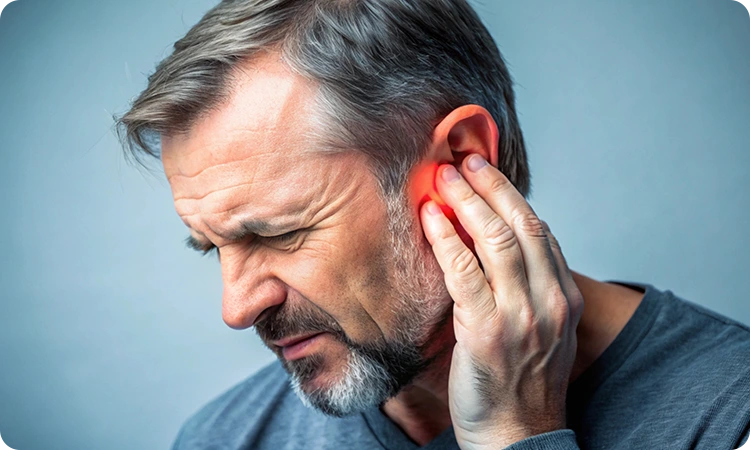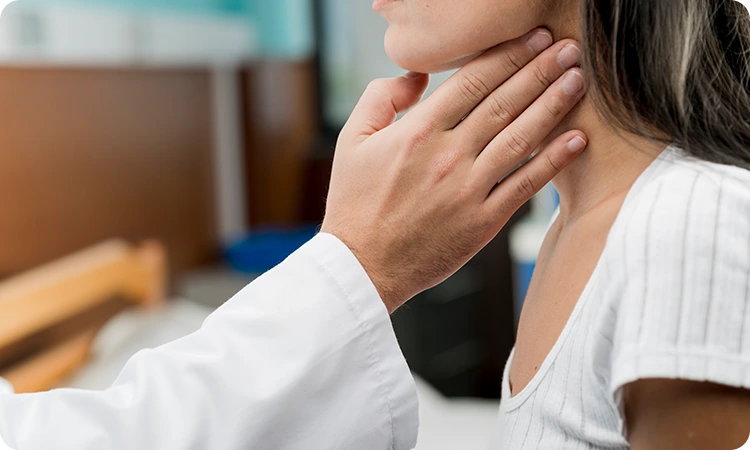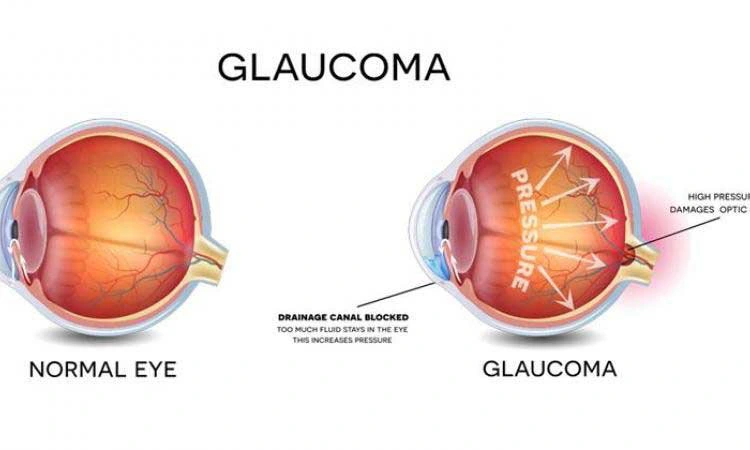Ear, Nose, Throat & Eye Diseases
Ayurvedic Treatment For Ear, Nose, Throat and Eye Diseases
Tinnitus

Tinnitus is an unwanted noise perception of internal origin, and rarely heard by others. In Tinnitus, phantom noises like ringing, buzzing, roaring, clicking, hissing, or humming in the ears may be present all the time, or it may come and go. These noises may vary in pitch and one may hear it in one or both ears. Subjective tinnitus is only heard by the patient due to the cause being internal. While you can hear the noise from the patient’s ear, it is called Objective tinnitus. This objective type of tinnitus may be caused by a blood vessel problem, a middle ear bone condition or muscle contractions. Meniere’s disease is a disorder of the inner ear that can lead to feeling of fullness in the ears, tinnitus, dizzy spells (vertigo) and hearing loss. Symptoms of Meniere’s disease appear to be the result of an abnormal amount of fluid in the inner ear. To treat, we need to identify the underlying, conditions that may be associated with her symptoms. Meet our Ayurveda doctor in Dubai or Ajman to identify the possible causes.
According to Ayurveda, Karna Nada (tinnitus) is due to the imbalance of Prana Vata. Prana Vata is a type of vata energy which resides in the head region and governs all sensory & motor functions. Contact our Ayurveda clinic in Dubai for the best Ear, Nose, Throat, Eyes treatment in Dubai to know about the benefits of Ayurvedic medicines & oil therapies (Abhyanga, Sirodhara treatment, Nasya, Sirovasthy, Karna poorana and Kabala) in Tinnitus.
Treatment Tips:
- Try applying Sesame oil for scalp before shower.
- Simply drop some sesame oil onto your little finger and massage it around the inside of each ear during your morning bathroom routine
- Reduce exposure to things that may make her tinnitus worse; eg: loud noises, nicotine, and alcohol.
- The more you worry and concentrate on the noise, the louder it will become. Stress management, through Ayurveda massages, meditation, exercise or yoga, may provide some relief.
- Reduce salt intake
- Avoid long spells in front of computer or on television screens
- Favor light and easy digestible food, warm food, ghee, wheat, rice, green gram,
- Reduce – frequent head bath, drinking cold water, exposure to cold wind, over exercise.
Ayurvedic Treatment For Ear, Nose, Throat and Eye Diseases
Tonsillitis and Adenoids

When bacteria and viruses enter our body through our nose or mouth, tonsils and adenoids act as a filter engulfing the offending organisms. This may cause a low-grade infection in our tonsils and adenoids, which stimulates the immune system to form antibodies against future infections. But sometimes the tonsils or adenoids are overwhelmed by a bacterial or viral infection. The result is tonsillitis or adenoid enlargement. Years ago, many young children had their tonsils removed. Today, tonsils are recognized for their role in filtering harmful bacteria and viruses that could cause more serious infections. Although tonsillitis itself usually isn’t serious, it can lead to complications like nephritis, rheumatic fever, ear infection, abscess etc if left untreated. Frequent hand washing is the best way to prevent all kinds of infections, including tonsillitis. Other common-sense precautions and hygiene practices apply too. Sometimes doctors recommend removing the adenoids if medicine doesn’t help and if your child experiences – difficulty breathing, sleep apnoea and recurrent infections leading to sinus and ear infections.
Dr. Shyam’s Ayurvedic treatment line is anti-bacterial or anti-allergic along with immuno-modulation (Vata & Kapha balance). The drugs of choice in Ayurveda ranges from the classical preparations like – Indukantham, vasarishtam, amritharishtam, guggulu panchapala choornam, haridra khantam, dasamoola kaduthrayam etc.
Treatment Tips:
- The general tips like drink more lukewarm fluids, gargle with warm salt water, use honey and lemon, suck on a throat lozenge or hard candy, humidify the air, avoid cold foods, smoke and other air pollutants can help.
- Frequent hand washing is the best way to prevent infections.
- Avoid close contact with anyone who’s sick
Self-care during infection:
- Drink warm liquids such as soup, broth are good choices.
- Gargle with salt water.
- Sip a mixture of honey and lemon at frequent intervals.
- Suck on a throat lozenge or hard candy which stimulates saliva production, which bathes and cleanses your throat.
- Avoid smoke and other air pollutants. Smoke irritates a sore throat.
- Rest your voice
Ayurvedic Treatment For Ear, Nose, Throat and Eye Diseases
Sinusitis

Our sinuses are hollow air spaces within the bones surrounding the nose. They produce mucus, which drains into the nose. If your nose is swollen, this can block the sinuses, interferes with drainage and causes mucus to build up and cause pain and infection. With sinusitis, the cavities around nasal passages (sinuses) become inflamed and swollen. This interferes with drainage and causes mucus to build up. If you have chronic sinusitis, it may be difficult to breathe through your nose. The area around your eyes and face may feel swollen, and you may have throbbing facial pain or a headache. Common causes of chronic sinusitis include Nasal polyps, Allergic reactions, Fungal infections, Deviated nasal septum, Trauma to the face, Respiratory tract infections, Eosinophilia etc.
Treatment Tips:
- Reduce your exposure to allergens
- Avoiding cigarette smoke and polluted air
- Drink plenty of fluids; avoid beverages that contain caffeine or alcohol.
- Carefully manage allergies and treat cold symptoms immediately
- Steam your sinus cavities or apply warm compresses to relieve congestion.
- Rinse out your nasal passages (Nasal lavage). Use a specially designed squeeze bottle (Sinus Rinse), bulb syringe or Neti pot to rinse your nasal passages.
- Drink plenty of warm fluids, which will dilute mucous secretions and promote drainage.
- Sleeping with your head elevated might help to reduce congestion.
- Humidifier may help prevent sinusitis
Ayurvedic Treatment For Ear, Nose, Throat and Eye Diseases
Vertigo

When people talk about vertigo, most people think about dizziness. However, there is a thin line of difference between normal dizziness & vertigo. The most common causes of vertigo are benign paroxysmal positional vertigo (BPPV) and Meniere’s disease. BPPV is due to a disorder of our equilibrium sensor located at the inner ear. This problem can be caused by a sudden change in body position, such as turning over in bed or getting in and out of bed. Meniere’s disease is characterized by deafness, ringing in the ears and occasional vertigo. There are many fewer common causes of vertigo like inflammation in the inner ear, low blood pressure, migraine headache etc.
In Ayurveda, vertigo symptoms are equated with bhrama. Bhrama is a balance disorder due to Vata & Pitta imbalance. According to Ayurveda, all movements in the body are governed and controlled by the energy factor Vata. When there is an imbalance while moving, Vata disorder is attributed there. Vata causes wear and tear and Pitta causes inflammation. Ayurveda treatments like Nasya (nasal drops), Sirodhara treatment, Thalam (application of medicine on crown), Karnapooranam (Ear drops) and Vata balancing internal medications may help.
Treatment Tips:
- Favour – sweet taste, milk, ghee, oil application on scalp, meat soups.
- Reduce – spicy, sour and salty foods, exposure to cold breeze and sunbath
- Avoid keeping awake at nights, over exertion, stress.
- Good rest is essential. Go to bed before 10:00 p.m.
- Try applying Ksheerabala thailam or few drops of Ghee on your scalp before shower.
- Intake of a teaspoon of ghee at bedtime followed by a glass of warm milk is a good home remedy. Eat raisins or dates.
- Include green gram (moong dhal) and urad dhal sautéed with ghee in your food.
- Consult with our Ayurveda Clinic in Ajman or Dubai for a prescription based treatment
Ayurvedic Treatment For Ear, Nose, Throat and Eye Diseases
Glaucoma

Glaucoma is a group of diseases that can damage the eye’s optic nerve and result in vision loss. Sometimes called the silent thief of sight, glaucoma can damage the vision so gradually; you don’t notice any loss of vision until the disease is at an advanced stage. Glaucoma occurs when the normal fluid pressure inside the eyes slowly rises. Increased eye pressure is due to a build-up of a fluid (aqueous humour) that flows inside your eye. This fluid normally drains into the front of the eye (anterior chamber) through tissue (trabecular meshwork) at the angle where the iris and cornea meet. When fluid is overproduced or the drainage system doesn’t work properly, the fluid can’t flow out at its normal rate and pressure builds up. Symptoms vary from patchy blind spots, tunnel vision, severe headache, eye pain, nausea and vomiting, blurred vision, halos around lights to redness in the eyes.
Ayurveda consider the pathology as Kapha imbalance in the eyes (Pitta seat); one should avoid daytime sleep, oily food, yoghurt, urud dhal, fermented items and other Kapha increasing foods. Therapies for head or eyes should only be done with the advice of an Ayurveda expert. Our favourite drugs of choices for Glaucoma treatment are punarnavadi kashayam, chandraprabha vati, dasamoolam kashayam, dasamoola hareetaki lehyam etc. A complimentary approach can be more beneficial; consult our Ayurveda doctor before taking any tips.
Treatment Tips:
- Drink small amounts of warm fluids over the course of a day.
- Regular exercise may reduce eye pressure in open-angle glaucoma. It’s especially important to avoid head-down yoga positions and stretches.
- Abstain from coffee and alcohol
- Refrain from smoking. Smokers have a higher risk in developing glaucoma.
- Protect eyes with a good pair of sunglasses
- The Indian gooseberry (Amla, Emblica officinalis), is exceptional in treating ocular problems including glaucoma. Its juice is taken with honey for better effects.
- Regular intake of Punarnava (Boerhavia diffusa) might be of help
- 5-10 grams of Triphala choornam for daily intake is effective for early stages of glaucoma
- Favor: healthy eating, green leafy vegetables, kale, spinach, broccoli, egg yolks, exercise regularly, drink warm water.
- Reduce: processed foods, margarine, fried foods, cookies, pastries, crackers, caffeine.
Ayurvedic Treatment For Ear, Nose, Throat and Eye Diseases
Short-sightedness (Myopia)

A person with a minus eye power is called short-sighted. Short-sightedness is technically termed myopia. A short-sighted person may see quite well without glasses when it comes to close work like reading and writing but is blind for long distance. While inherited tendencies are major factors leading to myopia, children who spend considerable time with close-up activities such as reading increase their chances of myopia. To compensate such focused vision, the eyeball grows longer. That way, less effort is needed to focus up, but the elongated eye can no longer focus on distant objects. Children, who read less, tend to spend more time outdoors, and better light may reduce the need to focus for near vision. Studies show that children who play sport are less susceptible to myopia. Diet may also be one of the factors contributing to the rise in myopia. Treatments are recommended to help improve circulation, reduce eye strain, and relax the eye muscles. It is possible that by combining exercises with changes in lifestyle behaviour, the progression of myopia may be slowed or prevented.
Treatment Tips:
- Favor: Leafy vegetables, fruits, Ghee, Amla, Triphala, honey, green gram, sun exposure, bird’s meat, regular oil application on scalp & feet.
- Reduce: Spicy and sour foods like spices, pickles and curd, fried items.
- Local Ayurveda measures like Nasya, Tarpana, and Anjana are effective.
- Recipes of Triphala, and medicated scalp oils are very helpful. Contact our Ayurveda doctor in Dubai or Ajman.
Ayurvedic Treatment For Ear, Nose, Throat and Eye Diseases
Diabetic Retinopathy

Too much sugar in your blood can damage the tiny blood vessels that nourish the retina. It may even block them completely and results in vision loss. In response to the lack of blood supply, the eye attempts to grow new blood vessels. But these new blood vessels don’t develop properly and can leak easily. Leaking blood vessels can cause a loss of vision. Scar tissue may also form, which can pull on the retina. Sometimes, this can cause the retina to detach. The disease, in the initial stages, start with mild blurredness in vision and cranes up to the stage of blindness. Ayurveda says, hereditary factors, body constitution, stress & strain, hypertension, smoking, hyperlipidaemia, proteinuria and lifestyle modifications are risk factors to Diabetic Retinopathy. Ama plays a major role in the pathology of Diabetic Retinopathy. Ayurveda treat diabetic retinopathy as Urdhwaga Raktapitta, Ojas Kshaya, Raktavritta Vata and Pranavritta Vyana. Ayurveda approach is to control diabetes and also to treat Diabetic Retinopathy simultaneously. Careful management of your diabetes is the best way to prevent vision loss.
Treatment Tips:
- Manage your diabetes. Make healthy eating and physical activity part of your daily routine. Take diabetes medications as prescribed.
- Monitor your blood sugar level.
- Keep your blood pressure and cholesterol under control.
- Quit smoking; smoking increases your risk of various diabetes complications, including diabetic retinopathy.
- Contact your eye doctor right away if your vision becomes blurry, spotty or hazy.
Ayurvedic Treatment For Ear, Nose, Throat and Eye Diseases
Cataract

Clouded vision caused by cataracts can make it difficult to read, drive a car or see the expression on a friend’s face, fading or yellowing of colors, double vision etc. Blurred vision, difficult vision at night, double vision, problem to differentiate colors, sensitivity to light, seeing halos around light, fading or yellowing colors are common symptoms of cataract. Most cataracts develop along with aging or due to injury changes. Cataracts can also be caused by other medical conditions such as diabetes, trauma or past eye surgery.
In Ayurveda, this disease is called Timira or linga nasha. Aggravated Vata is considered to be responsible for the manifestation of this disease. One of the properties of vata is to make things dry up. When the lens of the eye loses its transparency, vision becomes blocked. This condition is known as a cataract. If started at an early stage, Ayurvedic Cataract treatment is very effective. During Ayurvedic treatment the aim is to alleviate the aggravated body energies and nourishing and strengthen the nerves and tissues of the eye.
Treatment Tips:
- Have regular eye examinations.
- Quit smoking.
- Follow your treatment if you have diabetes or other medical conditions that can increase your risk of cataracts.
- Choose a healthy diet that includes plenty of fruits and vegetables.
- Wear sunglasses; ultraviolet light from the sun may contribute to the development of cataracts.
- Reduce alcohol use. Excessive alcohol use can increase the risk of cataracts.
